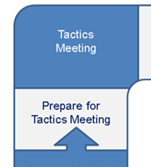 Howdy fellow ICS practitioners! EMSI recently conducted a three-day scenario-based Tactics Workshop to help 40 members of an Incident Management Team (IMT) improve quality collaboration, documentation, and performance of their participants during the “Preparing for Tactics” phase of the Incident Action Planning process. Some of these new collaboration concepts begin to address gaps in ICS doctrine, training courses, and incident management handbooks on how to enable the IMT to prepare, interact, and develop the tactical plan. After introducing these collaboration concepts and using updated incident (scenario) information, students prepared for and conducted three Tactics Meetings during the workshop.
Howdy fellow ICS practitioners! EMSI recently conducted a three-day scenario-based Tactics Workshop to help 40 members of an Incident Management Team (IMT) improve quality collaboration, documentation, and performance of their participants during the “Preparing for Tactics” phase of the Incident Action Planning process. Some of these new collaboration concepts begin to address gaps in ICS doctrine, training courses, and incident management handbooks on how to enable the IMT to prepare, interact, and develop the tactical plan. After introducing these collaboration concepts and using updated incident (scenario) information, students prepared for and conducted three Tactics Meetings during the workshop.
Day one of the workshop oriented the students to the required roles and responsibilities of each Tactics Meeting participant. This included a thorough review of primary and subordinate roles for Operations Section Chief, Planning Section Chief, Air Operations Branch Director, Logistics Section Chief, Communications Unit Leader, Safety Officer, Environmental Unit Leader, Situation Unit Leader, and Resources Unit Leader. Participants also reviewed the outcomes of the Command and General Staff Meeting, IMT operational agreements, staffing needs, and options for developing tactics from single group or multi-group with consideration for Branch Tactical Planning.
On day two, the students were organized into small IMTs and walked through the detailed operational planning process using knowledge and skills from day one. This included identifying strategies and tactics using a Work Analysis Matrix (ICS-234), developing an Operations Section organization that adheres to span-of-control principles, developing work assignments and resources requirements using an Operational Planning Worksheet (ICS-215), and assessing safety hazards and risks with an Incident Action Plan Safety Analysis (ICS-215a). The students practiced a Tactics Meeting and discussed follow-up tasks. On day three, the class was organized into two IMTs and given incident (scenario) updates that drove preparation and delivery of two additional Tactics Meetings.
Instructors evaluated students as they performed their roles and provided feedback at the end of each Tactics Meeting. At the conclusion, the students were given a knowledge-based written examination to evaluate individual learning of the content. The written examination augmented the performance-based assessments and real-time feedback that occurred throughout the workshop.
In total, there were 20 separate group activities during the workshop, emphasizing hands on practice for participants instead of strictly a lecture format. One student noted, “…I really liked how the interaction process was planned and the way this training was set up with the exercises, filling all forms, and not just the ones for your own role.” Another student offered this experience was an, “…[e]xcellent job laying the foundations in IMT dynamics, considerations, success factors, and how to collaborate on the development of tactics to achieve IC/UC objectives.” Yet another suggested that the workshop “…[m]ade me more confident as an Ops Section Chief. Working through the pre-tactics meeting activities several times helped me develop the muscle memory needed to coach others through that part of the Planning P.”
If giving your IMT a boost in skill and confidence in the Preparing for Tactics phase of developing an Incident Action Plan is a goal in 2024, consider hosting a Tactics Workshop. For additional information, please email info@emsics.com or call EMSI at 540-423-9004.

